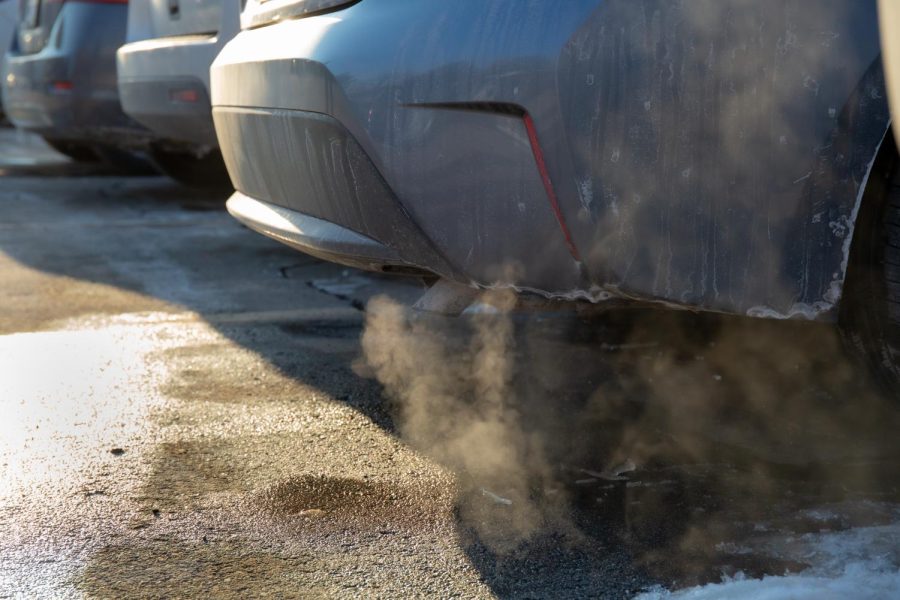Guest Opinion: Why It Matters to Be Idle-Free in Utah
Exhaust pipe of a running car at Shoreline Ridge on the University of Utah campus in Salt Lake City on Wednesday, Feb. 1, 2023. (Photo by Julia Chuang | The Daily Utah Chronicle)
February 2, 2023
Here in the Salt Lake Valley, winter is in full swing and with it comes winter-time inversions. Inversions are a naturally occurring atmospheric phenomenon where a layer of warm air traps cold air and harmful pollutants in the valley. Some of these pollutants come from homes, industry and businesses. According to the Environmental Protection Agency (EPA), over half of these pollutants come from mobile sources, including your vehicle. Inversion season in Utah is from Nov. 1 to March 31. Giving up your vehicle until April may sound like a far-fetched idea, but giving up idling is easy to do and will benefit your air quality, bank account and neighbors.
Idling is simply leaving your engine running while your vehicle is stopped. It is a contributor to poor air quality, global climate change and poor health outcomes. Idling emissions, like those from other sources, remain trapped in the valley during inversions, decreasing the quality of air you breathe. Poor air quality is associated with many negative health outcomes including asthma attacks, premature death, pneumonia, respiratory syncytial virus, respiratory irritation and disease, reduced lung function and growth, diabetes, high blood pressure, premature aging, mental health effects including suicide, heart attacks, absences in children, miscarriages, pre-term birth, low-birthweight infants, reduction in sperm quality, neurodevelopment disorders and premature death. Although these negative health effects could impact anyone, idling disproportionately affects children, pregnant people, older adults and people with pre-existing heart or lung disease or diabetes.
When multiple vehicles are idling in the same location — like a school — the combined emissions can create a hotspot resulting in high levels of toxic pollutants. We studied the local air pollution effects of drive-through COVID-19 testing sites during a busy testing period in the beginning of 2022, and compared the pollution impacts during inversions showing substantially elevated local pollution. Since the number of drive-through facilities increased during the COVID-19 pandemic, this analysis is relevant to other businesses as they adopt or increase drive-through services.
Idling is also expensive. Idling your car for only 10 minutes a day costs over $337 every year in gas alone. Idling also leads to unnecessary wear and tear on your vehicle resulting in a shorter engine lifespan and increased maintenance costs. Idling could also bring about a fine because of Salt Lake City’s idle free ordinance prohibiting unnecessary idling for more than 2 minutes.
There are many ways you can make a difference in our air quality this inversion season. Consider alternatives to driving — studying or working from home, walking, biking or taking public transportation (free to U students, faculty and staff). Create a carpool to reduce the number of vehicles on the road. Join a clean air challenge like the Utah Clean Air Partnership Clear the Air Challenge. Practice trip-chaining by completing multiple errands at a time so you can avoid high-emitting cold starts, which is when you start your vehicle after it has been parked for several hours. Perhaps easiest of all, turn off your engine when you stop your vehicle. Your health, your neighbors and your budget will thank you.
-Rachel Forrest, Adjunct Professor, Public Health Program, School of Nursing and Health Sciences, Westminster College and Daniel Mendoza, research assistant professor, Department of Atmospheric Sciences and adjunct assistant professor, Pulmonary Division, School of Medicine, University of Utah
The Daily Utah Chronicle publishes guest op-eds written by faculty, elected officials and other members of the public on topics relevant to students at the University of Utah. The Chronicle welcomes guest op-ed pitches here.








